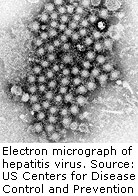More than 80 percent received follow-up care; cohort was composed of baby boomers
THURSDAY, Aug. 6, 2015 (HealthDay News) — A hepatitis C virus (HCV) screening program diagnosed chronic HCV infection in 4.2 percent of baby boomers tested, according to a study published in the August issue of the Journal of Hospital Medicine.
Barbara J. Turner, M.D., M.S.Ed., from the University of Texas Health Science Center at San Antonio, and colleagues developed strategies to implement baby boomer HCV screening in a hospital setting. They reported results for a prospective cohort of 6,140 baby boomers who were admitted to a safety-net hospital in South Texas. The program included clinician/staff education, electronic medical record algorithm for eligibility and order entry, opt-out consent, anti-HCV antibody test with reflex HCV RNA, personalized inpatient counseling, and outpatient case management.
The researchers found that 7.6 percent (240 patients) of the 3,168 eligible patients were anti-HCV-positive, which was more likely among younger patients, men, and uninsured patients (P < 0.05). One hundred thirty-four of the 214 patients who were tested for HCV RNA were positive (chronic HCV; 4.2 percent of all screened). Of those with chronic HCV, 96.3 percent were counseled and 80.6 and 38.8 percent, respectively, received follow-up primary care and hepatology care. Anti-HCV therapy was initiated by five patients. For 14 months, the total costs for startup and implementation were $286,482.
“Access to therapy is challenging for largely uninsured populations, and most programmatic costs of the program are not currently covered,” the authors write.
Copyright © 2015 HealthDay. All rights reserved.








